高一英语必修一unit3教案
Unit3FamilyMattersDevelopingideas教案-高一英语(2019)

B1U3 Family mattersJust a brother教案Learning Objectives: By the end of the class, students are able to1. To grasp the structure and the main idea of the passage;2. To know the characteristics of feature story;3. To deepen students’ understanding of family love. Students will be able to learn how toTeaching procedures:1.Freetalk: Ask students to watch a short video clip and talk about their siblings.Do you have siblings? How do you get along with them?2.Make a prediction: Ask students to predict the main idea of the passage accordingthe title and picture3 Read for main idea: Ask students to check their prediction and find out the main idea of the passage.Choose the main message of the passage C .A. Love and petition between the Brownlee brothers make them successful athletes.B. People have different opinions about Alistair Brownlee’s actions in the triathlon final.C. For Alistair Brownlee, family love is more important than winning the triathlon final.4.Read for structure: Guide students to find out the style and the structure of thepassage. (How many parts could a feature story be divided into?)5.Read for details: Ask students to read the passage again and find out the detail information.Para 23 Detail reading Ask students to find out the answers individually or cooperatively.1.What did Alistair do to help his brother?Alistair ran towards Jonny, caught him and started pulling him towards the finish line. Alistair then pushed his brother over the line.2.Why does Alistair think that having a brother is “an advantage”?Because having a brother trying to beat him at everything he does has been an enormously positive force on him.Para 41.How are opinions about the Brownlee brothers divided?Some people think the brothers should have been disqualified, while others think they should be highly praised for their actions2.What’s your opinion? please give your reasons.(Group discussion)6.Read for thinking: Ask students to read the example of Wu JianZhi and guidestudents to think about what have they done for their family members.Have you ever done something special for your family members like Alistar and Wu JianZhi? Let’s think and share.(Group discussion and share in front of class)7.Homework: Ask students to finish today’s homework after classLevel 1: Retell the story of the Brownlee brother using key words. Write it down.Level 2:Do you know any Chinese stories about family love? Share one with the class.。
Unit 3 Sports and Fitness Listening and 高一英语 必修一教案

Unit 3 Sports and FitnessListening and Speaking & Listening and Talking【教材分析】In this period, the theme is “sports and health”. Students will have a general understanding of how to invite a friend to a sports event and voice one’s own opinions about sportsmanship by listening and ultimately can form a healthy lifestyle and good attitudes towards sports.Listening and Speaking introduces the topic of sports events with posters advertising them, along with related vocabulary and grammar, and is a warm-up for the activities which follows.Listening and Talking introduces idea of sportsmanship by listening to a conversation, matching speakers’ opinions and giving and discussing one’s own opinions.【教学目标与核心素养】1. Instruct students to get main facts by listening and motivate them to talk about the topics about how to invite a friend to a sports event,voice one’s own opinions about sportsmanship by listening.2. Develop students’ sense of cooperative learning and individual thinking capability.3. Develop students’ different listening skills to solve different listening comprehensive problems.【教学重难点】1. Teach students how to focus on key words, not on single words or grammar.2. Prompt Ss to talk about the related topics, such as how to invite a friend to a sports event and voice one’s own opinions about sportsmanship.【教学过程】Part 1: Listening and SpeakingLead inThe teacher is advised to talk with their students about sports events.Boys and girls, look at the posters on p36, what sports events do you like to watch? Which sports would you like to try? After their small talk, the teacher can move on by finishing the following listening task:Play conversation 1 which is about Shen Qi’s main purpose for talking to Amy and after finishing listening for the first time, the students need to solve the following tasks.1. Purpose________________________________________________________2. Listen to conversation 1 again and write down the words that the speaker stresses: ______________________________________________________________After finishing the task above, the teacher is expected to play conversation 2 which is about Adam’s inviting Julie to a sports event and after finishing listening, the students need to solve the following task.Listen to Conversation 2. Then answer the following questions:1. When will the event happen?The event will happen___________________________________________________2. What's a "Blue Paint" run?A "Blue Paint" run is a fun run that_________________________________________3. Why is it called a "Blue Paint" run?Because people can buy water ballons flled with __________ and __________ the runners.4. If 200 people take part in the run and 400 balloons are sold, how much money will they collect?_____________________________________________________________________ Finally, after finishing the task above, the teacher is expected to instruct students to work in groups to finish the following project:Speaking ProjectWhat event or activity would you like to invite your friend to? Make a conversation with a partner.Ski Race: Zhangjiakou, a beautiful city in northern China, will host the Youth Ski Race in December.Track Meet: a great event for track –and –field lovers on 26 October.Gym Class: come and work out at a gym! You can make it.Part 2: Listening and Talking:The teacher is advised to talk with their new students about the related topic:Boys and girls , what do you think of sportsmanship? Let’s listen and find out: Play the listening and match each opinion with the right speaker. Who do you agree with? Why?Cao Jing _____________ Lily _____________ Max _____________A. An athlete should do his/her best to win.B. The girl should stop and help the other girl. Good sportsmanship is more important than wining!C. An athlete should think about honor and his/her fans if he/she is competing for his/her country.Talking projectWork in groups. Choose one of the situations below and make a conversation:●A soccer player should not pretend to fall down even if it helps his/her team.●In school teams, everyone should get a chance to play, not only the best players.●It is wrong to pay people millions of yuan to play sports.●Athletes should play only for their own country.EXAMPLEA: I agree with the idea that a soccer player should never pretend to fall down even if it helps his or her team. You should never cheat.B: Exactly! It's important to do the right thing.C: Well, don't think so. Many players do it, and they think it helps their team to win. A: That doesn't make any sense!B: I see what you mean, but the audience wants fair play.。
译林版高一英语必修第一册(2019版)_Unit3_Extended_reading_公开课教案
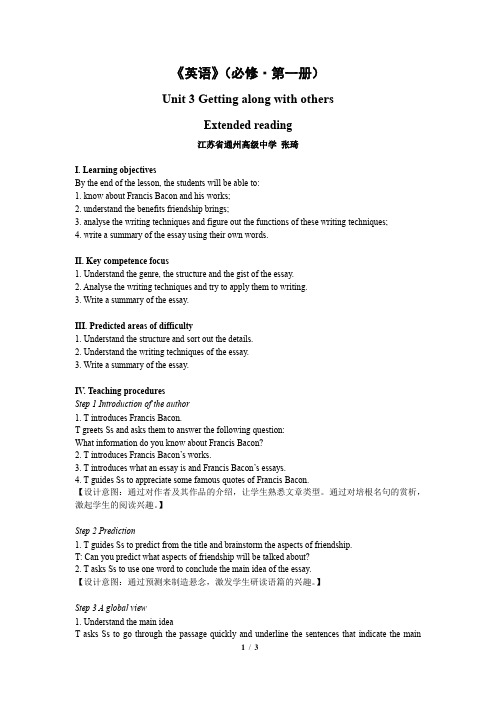
《英语》(必修·第一册)Unit 3 Getting along with othersExtended reading江苏省通州高级中学张琦I. Learning objectivesBy the end of the lesson, the students will be able to:1. know about Francis Bacon and his works;2. understand the benefits friendship brings;3. analyse the writing techniques and figure out the functions of these writing techniques;4. write a summary of the essay using their own words.II. Key competence focus1. Understand the genre, the structure and the gist of the essay.2. Analyse the writing techniques and try to apply them to writing.3. Write a summary of the essay.III. Predicted areas of difficulty1. Understand the structure and sort out the details.2. Understand the writing techniques of the essay.3. Write a summary of the essay.IV. Teaching proceduresStep 1 Introduction of the author1. T introduces Francis Bacon.T greets Ss and asks them to answer the following question:What information do you know about Francis Bacon?2. T introduces Francis Bacon’s works.3. T introduces what an essay is and Francis Bacon’s essays.4. T guides Ss to appreciate some famous quotes of Francis Bacon.【设计意图:通过对作者及其作品的介绍,让学生熟悉文章类型。
高一英语必修一unit3教学设计

Teaching PlanUnit 3 travel journalThe topic of this unit centers on travel. Travel is very beneficial and attractive activity to the students who can gains a lot, such as, general knowledge of geography, politics, communicating skills and travel experiences. However, before traveling, we should do a lot of preparation. In this unit, language study include some new words and useful expressions and the present continuous tense.Analysis of LearnersThis book fits the senior one students.The advantages of Ss:1.They are pretty active about what they are interested in.2.They are willing to share and demonstrate themselves in public.The shortage of Ss:1. Owing to the limited amounts of vocabularies , they always have difficulties in expressing thoughts and opinions in appropriate way.2. Sometimes they devoted themselves to the hot topic which they were enthusiastic about so that they didn’t draw their attention on the knowledge we should learn but just focused on the topic.Teaching PrinciplesWe should remember the main idea about the “Task-based language teaching” and “Situational teaching”.Among each part, “tasks” should be the line of the teaching. In order to complete the task, we teachers play a role as coaches instead of players. As a result, students are always the dominant role. Just give them an order, a tip, a hint or a suggestion to finish the task by themselves. Provide them more chances to speak and think.Teaching Aims and ObjectivesA. Knowledge and Grammar1. The students learn how to use the present continuous tense to indicate the future.2. Grasp the key vocabularies, phrases and sentences:journal,fare,transport,finally,cycle,persuade,insist,proper,properly,rapid,I prefer to...B. Ability1. The students learn how to make a travel plan.2. The students learn what the travel journal is and try to write their own ones.C. Feelings and Attitudes1. Sometimes we need not only do material preparation but also spiritualpreparation: courage, ambition, willpower and common sense.2. Encourage students to work as a team.3. Encourage student to record what they saw, what they heard, what they thought. Motivate them to be active, optimistic and insightful to life by travel.Important Point of Teaching1. Learn how to correctly use the present continuous tense to indicate the future.2. Learn how to make a travel plan.Difficult Points of TeachingMake students understand “be+v.ing” can indicate something happening in the future.Teaching AidsA computer, text books, note books, exercise paper, blackboard.Teaching MethodsThe methods are Task-based Language Teaching, Situational Teaching Counseling-Learning Community Language Learning.Show some pictures about my travel and ask Ss to show their experiences.-------Situational TeachingPair work: Make a conversation...-------Situational TeachingSummarize the points.-------Task-based Language TeachingLearning DesignUnit 3 travel journal1.Complete the following information card.2.Language points.Para1.___________________________________________________________________ ___________________________________________________________________ ___________________________________________________________________ ___________________________________________________________________ Para.2___________________________________________________________________ ___________________________________________________________________ ___________________________________________________________________ Para3___________________________________________________________________ ___________________________________________________________________ ___________________________________________________________________Practicing PlanUnit 3 travel journal一.Translation.1.他说服他的女儿改变了计划。
高一英语教案(说课稿):人教版必修一Unit3 Journey down the Mekong
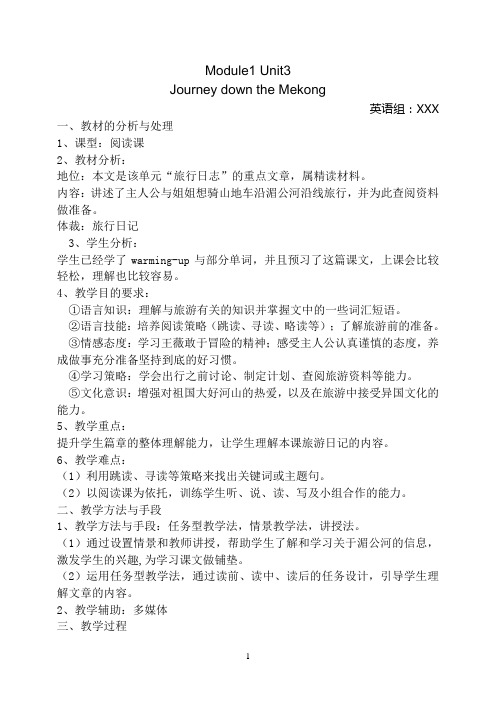
Module1 Unit3Journey down the Mekong英语组:XXX一、教材的分析与处理1、课型:阅读课2、教材分析:地位:本文是该单元“旅行日志”的重点文章,属精读材料。
内容:讲述了主人公与姐姐想骑山地车沿湄公河沿线旅行,并为此查阅资料做准备。
体裁:旅行日记3、学生分析:学生已经学了warming-up与部分单词,并且预习了这篇课文,上课会比较轻松,理解也比较容易。
4、教学目的要求:①语言知识:理解与旅游有关的知识并掌握文中的一些词汇短语。
②语言技能:培养阅读策略(跳读、寻读、略读等);了解旅游前的准备。
③情感态度:学习王薇敢于冒险的精神;感受主人公认真谨慎的态度,养成做事充分准备坚持到底的好习惯。
④学习策略:学会出行之前讨论、制定计划、查阅旅游资料等能力。
⑤文化意识:增强对祖国大好河山的热爱,以及在旅游中接受异国文化的能力。
5、教学重点:提升学生篇章的整体理解能力,让学生理解本课旅游日记的内容。
6、教学难点:(1)利用跳读、寻读等策略来找出关键词或主题句。
(2)以阅读课为依托,训练学生听、说、读、写及小组合作的能力。
二、教学方法与手段1、教学方法与手段:任务型教学法,情景教学法,讲授法。
(1)通过设置情景和教师讲授,帮助学生了解和学习关于湄公河的信息,激发学生的兴趣,为学习课文做铺垫。
(2)运用任务型教学法,通过读前、读中、读后的任务设计,引导学生理解文章的内容。
2、教学辅助:多媒体三、教学过程Step1: Lead inAsk some students to present their dialogue.(The homework of last class)【设计说明】采用对话形式导入,营造出宽松的学习气氛,为学生全面的课堂参与作了铺垫。
Step2: Pre-readingShow students some pictures and maps to know more about the Mekong river, its two names and the route it flows out of China.1. Names: Lancang River and Mekong River2. Route: China-Myanmar-Laos-Thailand-Cambodia-Vietnam-South China sea 【设计说明】利用图片来了解湄公河,为课文第三段做铺垫,同时,激发了学生的兴趣和好奇心。
人教版英语必修一Unit 3(Reading:Journey down the Mekong)教案
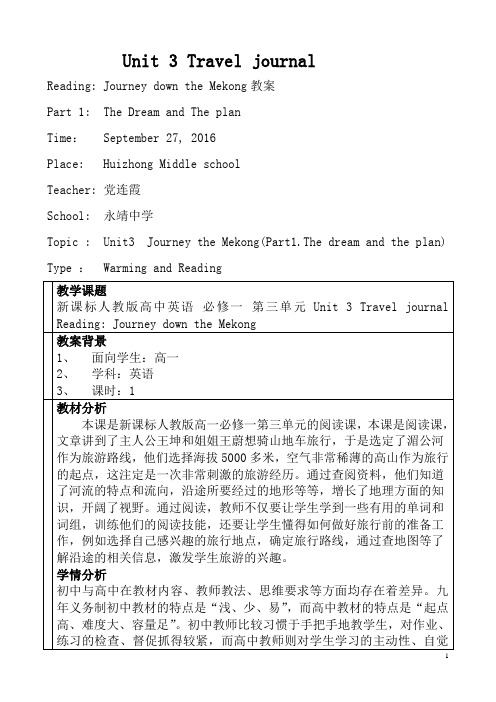
Reading: Journey down the Mekong教案
Part 1:The Dream and The plan
Time:September 27,2016
Place:HuizhongMiddle school
Teacher:党连霞
School:永靖中学
Para. 3The preparations before the trip & details about theMekongRiver.
•Who are Wang Kun and Wang Wei?
•What is their dream?
。Who are Dao Wei and Yu Hang?
4.Sometimes, the river becomes a ________ and enters ____ ______.
5.At last, the river _____ enters the South China Sea.
6.If you travel with them ,you will see all the following except
A. desert B. a waterfall
C. a delta D. a glacier
通过skimming及scanning阅读策略,引领学生关注文本的主题及涉及主题的主要信息。(也是这节课的重点和难点)
Step 4:Summary
Wang Wei and ____.___ have dreamed about ____ a great ___ ___.It was Wang Wei who first had the idea to ____ along the entireMekongRiver. My sister doesn’t ___________ details, because she doesn’t know the best way of getting to places.
选择性必修第一册教案unit 3
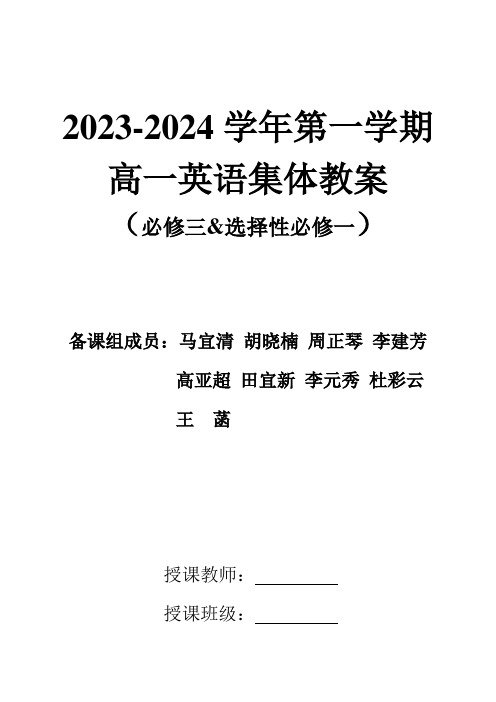
2023-2024学年第一学期高一英语集体教案
(必修三&选择性必修一)
备课组成员:马宜清胡晓楠周正琴李建芳
高亚超田宜新李元秀杜彩云
王菡
授课教师:
授课班级:
Book 1 Unit 3 Conservation
【单元教材分析】
本单元主题语境是“人与自然”,涉及的主题语境内容是环境保护,最终实现人与自然和谐相处。
本单元从听Linda Wei的讲座开始,引入塑料袋对环境的污染,然后又依次讲到犀牛的保护、物种灭绝的原因、后果和对策、Kevin和Alicia对塑料袋包装是否污染的讨论、英国的交通问题及对策以及工厂化养殖的利弊,帮助学生全面了解现阶段存在的人与自然不和谐相处的现状,使学生意识到保护环境,实现人与自然和谐相处的重要性,引导学生提高环保意识,为建设环境友好型社会做贡献。
【单元学习目标】
1.语言能力目标
能够理解人与自然相关的文章内容,听懂并谈论保护环境相关的话题,恰当使用所学词汇、句型描述环境问题和解决对策;能够通过议论文表达自己的观点和看法;能够为保护环境,保护动物提出合理的建议。
2.文化意识目标
能够通过了解人与自然不和谐相处的现状,树立正确的环保意识,为保护环境做贡献。
3.思维品质目标
能够通过比较、分析,准确获取语篇中有关环保问题和解决对策的相关信息,建立对人与自然关系的正确认识,并在此基础上联系自身实际,对环保问题表达自己的见解,提高环保意识,实现知识与思维能力的迁移。
4.学习能力目标
能够通过了解人与自然相处的现状,激发英语学习的兴趣;能够多渠道获取英语学习资源;能够选择恰当的策略与方法,监控、评价、反思和调整自己的学习内容和进程。
牛津译林版高一英语必修一教案unit3
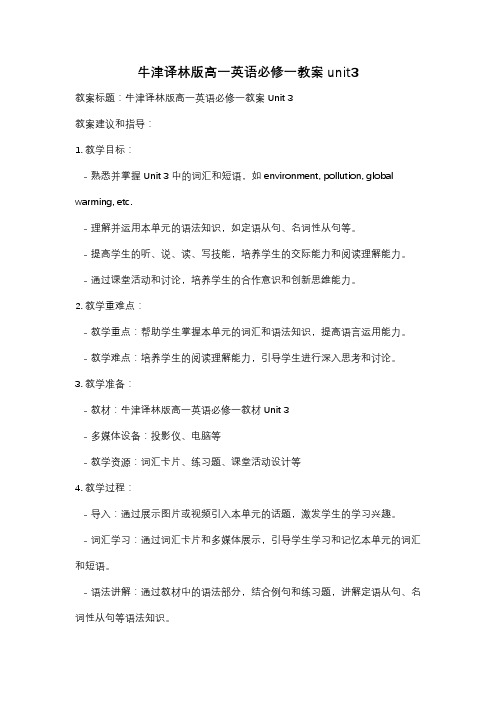
牛津译林版高一英语必修一教案unit3教案标题:牛津译林版高一英语必修一教案Unit 3教案建议和指导:1. 教学目标:- 熟悉并掌握Unit 3中的词汇和短语,如environment, pollution, global warming, etc.- 理解并运用本单元的语法知识,如定语从句、名词性从句等。
- 提高学生的听、说、读、写技能,培养学生的交际能力和阅读理解能力。
- 通过课堂活动和讨论,培养学生的合作意识和创新思维能力。
2. 教学重难点:- 教学重点:帮助学生掌握本单元的词汇和语法知识,提高语言运用能力。
- 教学难点:培养学生的阅读理解能力,引导学生进行深入思考和讨论。
3. 教学准备:- 教材:牛津译林版高一英语必修一教材Unit 3- 多媒体设备:投影仪、电脑等- 教学资源:词汇卡片、练习题、课堂活动设计等4. 教学过程:- 导入:通过展示图片或视频引入本单元的话题,激发学生的学习兴趣。
- 词汇学习:通过词汇卡片和多媒体展示,引导学生学习和记忆本单元的词汇和短语。
- 语法讲解:通过教材中的语法部分,结合例句和练习题,讲解定语从句、名词性从句等语法知识。
- 阅读理解:选择教材中的一篇阅读材料,设计问题和讨论活动,引导学生进行阅读理解和思考。
- 交流活动:设计小组讨论或角色扮演活动,让学生在小组内进行合作交流,分享自己的观点和想法。
- 语言运用:通过练习题和语言游戏,巩固学生对本单元词汇和语法的运用能力。
- 总结归纳:对本节课的重点内容进行总结和归纳,帮助学生理清思路和加深记忆。
- 作业布置:布置相关的作业,如课后练习题、写作任务等,巩固学生的学习成果。
5. 教学评估:- 通过课堂讨论、练习题和作业的批改,对学生的学习情况进行评估和反馈。
- 鼓励学生积极参与课堂活动,提高学生的学习兴趣和主动性。
6. 教学延伸:- 鼓励学生进行相关的课外阅读和研究,拓宽知识面和培养学生的自主学习能力。
- 1、下载文档前请自行甄别文档内容的完整性,平台不提供额外的编辑、内容补充、找答案等附加服务。
- 2、"仅部分预览"的文档,不可在线预览部分如存在完整性等问题,可反馈申请退款(可完整预览的文档不适用该条件!)。
- 3、如文档侵犯您的权益,请联系客服反馈,我们会尽快为您处理(人工客服工作时间:9:00-18:30)。
高一英语必修一unit3教案第一篇:高一英语必修一unit3教案Unit 3 Travel Journal Period1.Step 1.Warming up 1.Ask some questions:2.Do you often travel? Where have you been?3.2.Following the steps of the warm-up on page 17.Step2.Pre-reading1.Show some traveling pictures of the teacher’s.2.Ask Ss : which river is the longest one in the world and which is the largest one;which river is the longest one in China.3.Ask Ss: how people who live along a river use it.Step3.While-reading1.Scanning: Ss read quickly and answer: What are they going to do?2.Skimming: Ss read again and finish comprehending 1 on page 19.Ss read and get the main ideas of each paragraph.Ss list the countries that the Mekong River flows through.Step4.After-readingSs in pairs and discuss: Wang Wei’s and Wang Kun’s similar and different attitudes about the trip.Similar attitudes about the trip Different attitudes about the trip Both Wang Wei and Wang Kun think…1.Taking this trip is a dreamcome true.2.That they will enjoy this trip a lot.3.They should see a lot of the Mekong.4.That most of the Mekong will be found in Southeast Asia.Wang Wei believes…1.They must start in Qinghai where the river begins /see all of the Mekong.2.That they don’t need to prepare much Wang Kun believes…1.It is too cold and high to start in Qinghai.2.That using an atlas is very important.Step5.Assignment 1.Surf the internet and get more information about the Mekong River.2.Retell the passage use your own words.Period2.Step1.Warming upAsk some Ss to retell the passage that they have learnt last period.Step2.Learning about the languageTeacher explains some language points in the text on page 18.1.Persuade sb.into /out of sth.: cause sb.(not)to do sth.by arguing or reasoning with him 说服或劝说某人(不)做某事He is easily persuaded.Wang Kun couldn’t persuade his sister to change her mind.persuade sb.(that clause): cause sb.to believe sth.;convince sb.使某人信服How can I persuade you that I am telling the truth?2.insist(v.): demand(sth)forcefully, not accepting a refusal 坚持或坚决要求;eg.Since he insisted, I had to stay.insist on sth/doing sth: require or demand;refuse to accept an alternative 一定要(某事物),坚决主张She insists on getting up early and playing her radio loud.3.care about: be worried, concerned or interested 忧虑,关心,惦念don’t you care about anybody? I don’t care about what happens to him.care for /to do: be willing or agree to do sth.;wish or like to do sth.Would you care a drink? Would you care to go for a walk? care for sb.1).Like or love sb.He cares for her deeply.2).Look after sb;take care of sb;be responsible for sb Who will care for your child if you are out?4.Once she has made up her mind, nothing can change it.她一旦下了决心,什么也不能使她改变。
once: adv.1).for one time 一次I have only been here once.2).at some time in the past 一度;曾经 He once lived in Zambia.3).all at once: suddenly 突然All at once the door opened.conj.= as soon as 一旦;一…就…Once you understand this rule, you’ll have no further difficulty.Step 3.Practice1.Ss finish Ex 1 and 2 on page 20 by themselves.2.check the answer.3.Ss do Ex 3.on page 20.4.Teacher gives Ss suggested answer and tell them why if the Ss have any problem.Step 4.Assignment1.Learn the useful expressions by heart.2.Finish Wb.Ex1 on page 56.3.Finish Wb.Ex 2 on page 57.Period 3.Step1.Revision Check the answers of Wb Ex 1 and 2 on page 56 and 57.Step2.Discovering useful structures1.Ss look at the following sentences and underline the verbs.Are you working this evening?We’re having an English party t his weekend.He is leaving tomorrow.Let Ss themselves find the rules and tell what tense they are used.2.Ss finish the dialogue on page 21 and pay attention to the tense.Suggested answers:are going, going, going/traveling, staying, are coming, coming, are going, 3.Ss finish part 3 on page 21.Step3.T alking1.Ss four in one group and have a discussion about the topic on page 55.2.Ss make a list about the objects: which is the most useful and which is the least useful and why.2.the most useful objects the least useful objects3.Ss show their result to the class.Step4.Speaking 1.Ss work in pairs and discuss: what do you think a dam does to a river and the people who live on it?2.Make a list of some good and bad things a dam does.3.Discuss your report with your classmates and then show it in class.Step5.AssignmentFinish Wb Ex 1 using structures on page 57.Period4.Step1.Warming upAsk Ss some questions about Journey Down The Mekong(I).1.What was Wang Kun and Wang Wei’s dream?2.What can they see when they travel along the Mekong?3.Willthey have some difficulties in their journey? What are they? Step2.Reading1.Ss read the passage: a night in the mountains and answer the following questions:How does Wang Kun feel about the trip now? What do you think has changed his attitude?2.Ss make a dialogue about things happen the next morning before Wang Kun and Wang Wei leave their camp.3.show the dialogue to the class.Step3.Reading1.Ss read the passage: The End Of Our Journey on page 592.Ss fill in the form with the information from the travel journal.Topic Laos Cambodia Vietnam Population Weather Learning FarmingPeriod5.(Writing)Step1.Pre-writing 1.Ss read the passage and get the general idea about it.2.Ss make a list of details from the travel journal that you believ e are real and you don’t believe are real.Step2.While-writing1.Ss write a short letter to Wang Wei as one of her friend and ask her to describe: how she feels, what she is doing, and some place you want to know about.Then wish her well on her journey by using some of the following expressions:Have a nice/good time.Have a nice/good trip.Good luck on your journey.Say “Hello” to …Give my love/best wishes to… Have fun.Take care.Write to me.2.Ss read their writing and check the mistakes by themselves.Ss exchange their writing and correct the mistakes.Ss rewrite the letter again.Step3.After-writing Choose some samples and show them in class.Tips on writing:Pay attention to the form of writing a letter.Pay attention to the tense while writing.Pay attention to the structures of thesentences.Step4.AssignmentSs in group 3-5, make an advertisement or finish the project on page 61.第二篇:高一英语必修一 unit3语法课教案Book1 unit3 Travel Journal(学案)课型:语法课设计人:邓婷婷时间:2013-10-15 学习目标: 1.从本单元找出以下的重点短语并识记。
